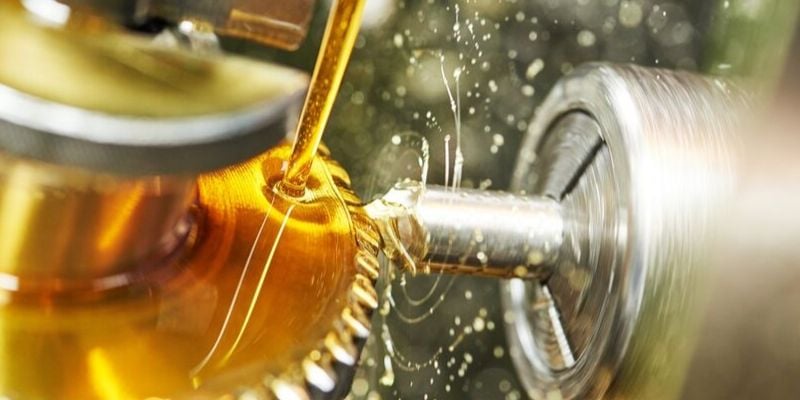The latest news straight to your inbox
Stay up to date with product news and offers by joining our mailing list.
Choosing The Right Industrial Gear Oil

When it comes to maintaining the gearbox of your machine, choosing the right industrial gear oil is crucial. It should be considered during all set up or maintenance as it is an integral structural element. When selecting a gear oil, certain parameters should be considered. Parameters such as speeds, performance, environmental influences (weather conditions etc) and special operating conditions (extreme temperatures) need to be considered.
Once you have considered these parameters you can then select the:
-
Oil type (mineral or synthetic)
-
Viscosity - This is usually stipulated by the machine itself.
-
Wear protection level
Gear oil properties
The properties of gear oils are determined by the base oil and additives. The essential requirements for gear oils are:
-
Operating temperature range
-
Viscosity
-
Ageing behaviour
-
Low temperature behaviour
-
Corrosion protection
-
Foaming behaviour
-
Elastomer compatibility
-
Compatibility with interior coatings
-
Wear protection - fretting, micro-pitting
Gear oil types
Polyglycols
Polyglycol oils are very well suited to gears with a high proportion of sliding friction, e.g, worm and hypoid gears. When they are combined with the right additives they show excellent anti wear behaviour, especially in worm gears made from steel/bronze.
Gear oils based on specific polyglycols and additives may be used for the manufacture of physiologically safe gear lubricants. (H1 oils) for use in the food-processing and pharmaceutical industries.
You should avoid mixing polyglycols and mineral oils. Polyglycols have a high resistance to oxidation so are often used at extremely high gear temperatures.
Key properties of polyglycol oils
-
Very low friction results.
-
Can be used for the manufacture of food safe gear oils.
-
High resistance to oxidation.
-
Good for high gear temperatures.
What is an Ester oil?
Synthetic ester oils are a combination of acids and alcohols. Ester oils that are used in industrial gears are normally the rapidly biodegradable type, their performance is normally compatible with polyalphaolefin or polyglycol oils.
Depending on the individual oil, ester oils may show particularly good thermal resistance or a particularly good low-temperature behaviour. Mixing ester oils with polyglycols is possible to a limited extent only.
What is Polyalpha-Olefins (PAO’s)?
With a chemical structure similar to mineral oils, Polyalpha-Olefins or PAO’s as they are commonly known are generally known under the designation synthetic hydrocarbons, also know as SHC’s. Their compatibility with paints and seal materials is similar to that of mineral oils. They should also be disposed of or reprocessed in the same way as mineral oils.
Gear oils that are based on PAO show good oxidation resistance which allows much longer between oil changes. They also show very good low-temperature behaviour.
Operating temperature
In industrial gears the operating temperature is between 20 and 150°C. This depends on the type of gear and the application.
![]()
When using mineral based gear oils, an oil temperature of
75-80°C should not be exceeded.
Heating of a gear system, especially the gear wheels , bearings and lubricant is one of the most important criteria to evaluate a gears performance. Apart from design-related influences, the conditions in which the gear is operating is the biggest factor. Gear oil temperatures rise when they are exposed to thermal radiation or an increasing ambient temperature. They are not quite as high when the gear is operated under partial load conditions or intermittently. It is important not to exceed the permissible temperature limits in individual gear components, the lubricant and the accessories (filters, pumps etc). When it comes to viscosity selection the oil sump temperature or temperature of the injected oils is an important factor.
If the operating temperature is above average or there are temperature peaks then this can indicate malfunctions or incipient damage.
Wear protection
Gear manufacturers are constantly trying to solve the problem of seizure, micro-pitting and wear reduction under high sliding loads in their machines. When gears are heavily loaded they are potentially susceptible to seizure and pitting, high loads generate high pressures and temperatures, which can lead to tooth damage resulting in premature gear failure.
Synthetic gear oils contain additives that help to protect against micro-pitting, spalling, surface fatigue and scuffing which makes them an excellent option for machines that are under heavy loads.
Conclusion
Hopefully after reading this article you will have more of an understanding of which industrial gear oil is right for you. Most machines will specify a viscosity but will not specify whether to use a synthetic or mineral oil as this ultimately depends on operating conditions and load level of your machine. If you require any further assistance please contact us and one of our Castrol® Experts can help you make the right choice. You can also download a free gear oil guide that shows the different oil properties in a quick, easy to understand the comparison.
Get more straight to your inbox
Join our mailing list and get the latest news and updates
Don't miss anything, join our mailing list today
By subscribing you agree to Univar's privacy statement which can be found here.
Free delivery on orders over £30
Secure payments








